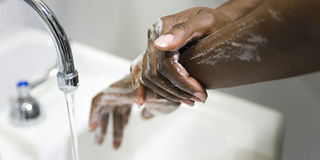Teach hygiene in primary schools, save lives

Washing hands. In Kenya, hand washing education and practice in schools is most relevant because of the high likelihood of faecal contamination of the school environment. PHOTO | FILE | NATION MEDIA GROUP
What you need to know:
Hand hygiene should be introduced very early to influence healthy behaviours since lifestyle and behavioural choices are made in childhood.
- A recent WHO report shows hand hygiene significantly reduces infectious illnesses yet they are evidently lacking in educational settings.
- Its promotion among children is possible as their poor hygiene habits are less established. Also, they are within the age where lifelong behaviour is established.
Today is Global Hand Washing Day. This year’s theme is “Clean Hands – A Recipe for Health”. It has a focus on the link between hand washing and food — food hygiene and nutrition.
The annual event is meant to mobilise and motivate people to recognise the benefits of and improve their hand washing habits by using soap and running water. Numerous studies have shown that many young children in developing countries do not wash their hands in that manner.
Every 23 seconds, a child dies from preventable causes such as pneumonia and diarrhoea. The simple act of washing hands with soap is the single most effective way to stop child deaths. It can reduce the spread of pneumonia by 23 percent and diarrhoea by 45 percent.
WATER SOURCES
In Kenya, hand washing education and practice in schools is most relevant because of the high likelihood of faecal contamination of the school environment. Many schools, especially in rural settings, have few latrines, inadequate water supplies, poor quality of available water sources, water storage in containers that permit hands to touch and contaminate stored water and lack of hand-washing facilities.
Besides affecting school attendance, the resulting burden of diarrhoeal diseases and parasitic infestations has a negative impact on students’ growth, nutritional status, physical activities, cognition, concentration and academic performance. Well-practised and consistent hand-washing can also result in significant benefits in reducing gastro-intestinal and respiratory infections.
BEHAVIOURAL
Hand hygiene should be introduced very early to influence healthy behaviours since lifestyle and behavioural choices are made in childhood.
A recent World Health Organisation (WHO) report shows hand hygiene significantly reduces infectious illnesses yet they are evidently lacking in educational settings that host children and their teachers and caregivers. Its promotion among children is possible as their poor hygiene habits are less established. Also, they are within the age where lifelong behaviour is established.
ACHIEVE SDG 6
Governments have put efforts to achieve UN Sustainable Development Goal (SDG) No. 6 — access to water and sanitation for all — which is critical for effective hand washing with soap. We can achieve this goal if a high proportion of the population is using safely managed sanitation services.
One of the low-cost interventions by the Ministry of Health in ensuring universal health coverage (UHC) is the scaling up of maternal and child health by ensuring exclusive breastfeeding and hand washing to prevent transfer of diarrhoea-related disease through food during the weaning period.
90 NEWBORNS
In developing countries, diarrhoea kills 2,195 children — more than malaria, Aids and measles — and 88 percent of the cases are linked to poor sanitation, improper hygiene and unsafe water, WHO says.
Diarrhoea is the second-most common cause of death among school-age children in Sub-Saharan Africa. In Kenya alone, 90 newborns die everyday within their first months of life.
To achieve UHC in Kenya by 2022, place greater focus on primary healthcare, particularly prevention. Low-cost high-impact interventions such as hand washing reduce child deaths and should be scaled up.
Mr Waka is the programme director, Water, Sanitation and Hygiene, at Amref Health Africa in Kenya.





